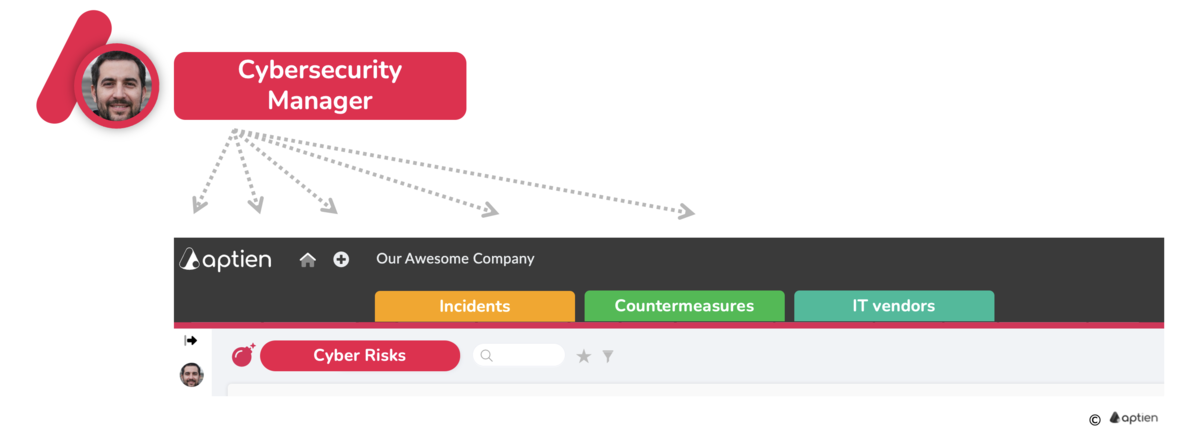Explaining Cybersecurity manager Role Simply for Business Humans
- The Cybersecurity Manager is responsible for implementing practical security controls to protect the company’s systems, data, and users, ensuring compliance with applicable laws and best practices.
The Cybersecurity Manager oversees the comprehensive management of cybersecurity within the company. Is responsible for developing and implementing strategies to protect a company's IT systems and data from threats and vulnerabilities. This role ensures digital assets are secure and compliant with regulations. They identify vulnerabilities, deploy security measures, respond to incidents, and conduct regular audits. Additionally, they educate employees on best practices and stay updated on cybersecurity trends to safeguard the company's infrastructure.
Summary: What a Security Manager Does in Small and Medium Businesses
Small and medium-sized businesses (SMBs) typically lack the capacity and resources to have a dedicated cybersecurity manager as a full-time position. Therefore, they often use external services, hiring or outsourcing a cybersecurity manager as an expert.
When Is Outsourcing a Cybersecurity Manager Worth It?
- It's not a full-time job in a small or medium-sized business.
- Higher Expertise: A hired expert applies their specialized knowledge and focuses exclusively on cybersecurity.
- Reduces High Costs: With outsourcing, you don't pay a full salary for a 'whole employee,' but only regular fees for the service and the expert's capacity. This is similar to how companies hire a Data Protection Officer (DPO) under GDPR.
- Addresses specialized legislative requirements, such as NIS2
What Does a Security Manager Do? Practical Priorities for SMBs
- Creates and maintains security documentation and practical guidelines
- Ensure compliance with industry-specific regulations
- Implement practical security controls (antivirus, updates, backups, access control)
- Monitor alerts and respond quickly to incidents
- Monitors cybersecurity threats
- Trains employees in cybersecurity
- Manage third-party IT vendor risks
- Regularly tests for vulnerabilities
How Aptien Simplifies the work of Cybersecurity manager
- Centralized Risk Repository: A single location to document and track all identified risks.
- Risk Assessment: Tools to evaluate the likelihood and impact of risks.
- Risk Mapping and Visualization: Visual tools to map and understand the relationships between risks.
- Business Impact Analysis: Visualise relations of assets, critical chain
- Compliance Management: Ensures adherence to regulatory requirements and standards.
- Incident Reporting and Tracking: Simplifies the process of reporting and managing incidents.
- Task and Measure Management: Tracks the implementation of risk mitigation actions.
- Collaboration Tools: Facilitates communication and coordination among team members.
Cybersecurity Manager in Small and Medium-Sized Companies
Small and medium-sized companies often lack the capacity and resources to have a dedicated, full-time cybersecurity manager. As a result, they typically rely on external services and hire a cybersecurity manager as an expert consultant.
- In most SMBs (under ~250 employees), a dedicated Cybersecurity Manager is uncommon unless they are a tech company or handle regulated data (healthcare, finance).
- Security responsibilities are often part of IT Manager, IT Director, or outsourced to an MSP/MSSP (Managed Security Service Provider).
- SMBs focus primarily on practical, risk-based security controls rather than broad policy frameworks.
When is it worth outsourcing a cybersecurity manager?
- Part-Time Requirement: In small and medium-sized companies, cybersecurity management is not a full-time job. Outsourcing allows companies to access expertise as needed without the commitment of a full-time position.
- Higher Level of Qualification: Outsourced experts bring specialized knowledge and experience in cybersecurity, ensuring high-quality protection for the company.
- Cost Efficiency: Outsourcing reduces costs by avoiding the need to support a full-time employee. Companies pay regular fees for the expert's services and capacity, similar to hiring data protection officers under GDPR.
- Compliance with Specialized Legislative Requirements: Outsourced cybersecurity managers help companies meet specific legislative requirements, such as NIS2.
Core Responsibilities and Job Description of Cybersecurity Manager
1. Security Policies and Procedures
- Develop and maintain simple, actionable IT security policies (e.g. password policy, acceptable use policy, remote work policy).
- Establish incident response procedures to quickly handle security events.
- Maintain asset inventory of critical hardware, software, and data.
2. Risk Management
- Conduct basic risk assessments to identify and prioritize security risks.
- Recommend and implement cost-effective mitigation strategies.
3. Security Operations
- Ensure antivirus/EDR solutions are deployed and updated on all endpoints.
- Oversee firewall configuration, VPN, and secure remote access.
- Manage user access controls (least privilege, role-based access).
- Ensure patch management processes are in place and executed.
4. Security Monitoring
- Monitor security alerts from endpoint security, firewall, and cloud services.
- Stay up-to-date with current cyber threats relevant to the business.
5. Incident Response
- Coordinate investigation and remediation of security incidents (e.g. phishing, malware infection).
- Document incidents and recommend improvements to prevent recurrence.
6. Data Backup and Recovery
- Ensure regular backups are performed, tested, and secured (including cloud backups if used).
- Maintain and test disaster recovery plans to restore operations after major disruptions.
7. User Awareness Training
- Deliver or arrange regular security awareness training for employees (phishing, password hygiene, safe browsing).
- Promote a security-conscious culture across the organization.
8. Vendor and Compliance Management
- Evaluate security risks associated with third-party vendors (especially for cloud services).
- Ensure compliance with applicable data privacy or security regulations (e.g. HIPAA, PCI-DSS, FTC Safeguards Rule).
- Assist with contract reviews to ensure vendor security requirements are included.
9. External Coordination
- Coordinate with external IT service providers or security consultants for specialized assessments (e.g. penetration tests, compliance audits) as needed.
- Optional (For SMBs with Higher Compliance Requirements)
- Lead or support compliance initiatives (e.g. SOC 2, ISO 27001 readiness).
- Oversee penetration testing or vulnerability assessments by external providers.
- Report security metrics and risks to executive leadership regularly.
